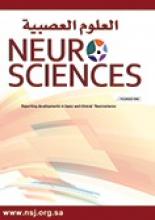Abstract
OBJECTIVE: To assess the effect of rheumatoid arthritis (RA) on autonomic function of a group of RA patients in comparison with a normal control group by measuring the frequency gain response of the 2 groups. Also, to determine whether the duration of RA correlated with measures of heart rate variability signal (HRV) using an approximate entropy index (ApEn).
METHODS: We evaluated 52 patients with RA, and 51 matched healthy subjects at the Arthritis Center, Johns Hopkins Hospital, Maryland, United States during 2004 and 2005. We measured breathing at different rates, and the HRV signal derived from ECG. The auto-power and cross power spectra between HRV signal and breathing signal at different breathing rates was calculated, and the frequency gain response for both groups was obtained. The ApEn, described as a measure of regularity of HRV, was calculated for both patients with RA and the healthy control subjects.
RESULTS: Both frequency gain response and ApEn measure were reduced in patients with RA in comparison with the control group. The power spectra of patients with RA showed a reduced high frequency (HF) value and higher low frequency for control subjects. However, the ApEn measure was significantly reduced in longer RA duration patients.
CONCLUSION: These findings suggest that the spectral analysis of HRV signal using breathing at different frequencies may detect an unbalance of the autonomic system of patients with RA, especially with increasing the sympathetic activity (higher low frequency) and reducing the parasympathetic tone (reduced frequency gain response), which can lead to sudden death in patients with RA. The ApEn may be a marker of RA stage.
- Copyright: © Neurosciences
Neurosciences is an Open Access journal and articles published are distributed under the terms of the Creative Commons Attribution-NonCommercial License (CC BY-NC). Readers may copy, distribute, and display the work for non-commercial purposes with the proper citation of the original work.






